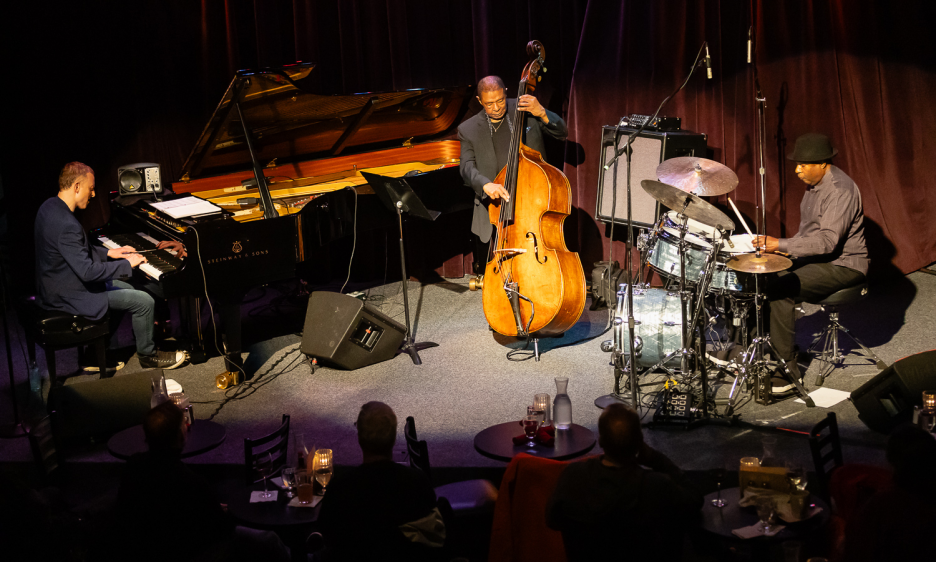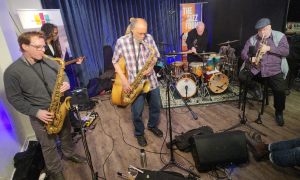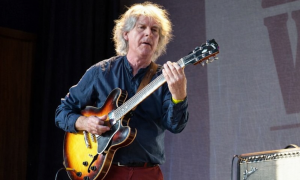Home » Jazz Articles » Live Review » Noah Haidu Trio with Buster Williams & Lenny White at Jazz Alley
Noah Haidu Trio with Buster Williams & Lenny White at Jazz Alley

Courtesy Lisa Hagen Glynn
Haidu has skillfully used this remarkable kinship and the wisdom of time-proven classics to facilitate an intuitive deep dive into the jazz piano trio legacy
Jazz Alley
Seattle, Washington
May 21, 2024
Pianist Noah Haidu is in jazz terms, a "new voice," even though he has been releasing notable recordings as a leader for well over a decade now. While his recordings have featured his modern, original compositions, his last two albums, Standards (Sunnyside, 2023) and Standards II (Sunnyside, 2024), have featured, well, jazz standards. The common thread between these two recordings is iconic bassist Buster Williams, who at 82 years of age is still playing beautifully, innovatively. And so, the soulful pianist has hit the road with Williams and another jazz master, the drummer and fusion pioneer, Lenny White, with whom Williams has a five decades-long musical relationship. In building his voice in this canon, Haidu has skillfully used this remarkable kinship and the wisdom of time-proven classics to facilitate an intuitive deep dive into the jazz piano trio legacy.
As a trio, there is more than a rich history to draw from these jazz adventurers, as the threesome turn classics like "After You've Gone," and Duke Ellington's "I've Got it Bad" into modernist palettes of color, cadence and rhythmic unpredictability. Initially billed as the "Noah Haidu Trio'' on the Jazz Alley website, the title was recently changed to "Buster Williams, Lenny White, Noah Haidu Trio—Celebrating the 40th Anniversary of Keith Jarrett's Standards Trio"—a title more befitting the jazz royalty surrounding the daring and comparatively young pianist. The Jarrett reference seems to allude to that trio's treatment of jazz standards as launching pads to new space, with Jarrett blasting off into unknown galaxies of sound with bassist Gary Peacock and drummer Jack DeJohnette. It is humbling to consider that during the decades-long tenure of that trio, Williams was playing with everyone under the sun, including Miles Davis and Herbie Hancock. He became one of the genre's most skilled and respected practitioners of the double bass, while White too established himself with Davis. Next the young drummer joined Chick Corea's Return to Forever fusion juggernaut, and the myriad of artists that followed. Haidu took the Jazz Alley stage with all of this in hand, utilizing what could be seen as the weight of history, as a propellant to new ideas and modern formulations.
After introductions, the trio slipped into the tranquil waters of "Someday My Prince Will Come," playing gently with the classic melody. Williams' bass was strong in the mix, while Haidu steered through melodic intricacies. It took a few uncomfortable minutes for the sound engineer to achieve balance in the mix, but once accomplished, the trio sounded marvelous, as expected. The mix was essential, as Haidu plays softly for the most part, producing a delicate, rich sense of harmonic dynamics blended with a style of melodic improvisation that leaves nothing astray. His playing is orchestral in a sense, leaving the audience required to listen closely, to take all of it in as one wash of sound. It was later disclosed that the band had arrived in Seattle a bit late, and the soundcheck was brief. Give a save to the man at the board—the music seemed to take off from that point forward.
As always, it was a pleasure to witness the elegant technique of Williams, a true living master who is playing at an extremely high level. White, who has always had a way to make more of less, played sparingly at times, quietly when need be, and always in perfect cadence with his bandmates. His place in the group mind was so essential in tying Haidu's forward-charging dynamic flow with Williams' thunderous presence. Whether playing on the beat, or launching into brief forays in double time, his relaxed, focused persona was front and center. For Haidu as the leader, his abandonment of playing original material on this tour in favor of "just showing up and playing," was a liberating factor between the three. After all, what pianist wouldn't want to just "show up and play tunes" with the likes of Williams and White?
It wasn't until the fifth tune of the set that the band shifted into high gear and began to swing hard, doubling down on the 1935 Cole Porter classic, "Just One of Those Things." Through the 90 years of the song's history, it has unquestionably been played every which way in terms of rhythm and tempo. In this case, it was relentless swing, with Haidu's chordal figures and sparkling right hand runs putting the audience on the collective edge of their seats. Williams, never one to be shy, pulled down the groove while adding melodic fragments to the mix. The southpaw White almost served notice to the generous Jazz Alley crowd that he can be out front, loud and adventurous as well, displaying considerable chops in the process. The tune was a reminder that in the jazz piano trio format, it's not the tunes—it's the cats playing them. One way or another, good musicians are going to find new paths to wander within the harmonic confines of tunes that have been played extensively for close to a century. It would seem that with Haidu's straight-ahead, forward-charging style, innovative interpretation might be somewhat limited, but this was far from the case. Again, this goes back to the beginning of the set, to listening fully—Haidu's playing is intricate and melodic, with little collateral damage in the process. His knowledge of the tunes is so extensive that his melodic interpretations are sequestered sometimes quietly within the dense harmony of most jazz standards. His lines are akin to mosaics of sound, his overall playing marvelous.
"This trio is so cool, they can play 'Georgia On My Mind,' and nobody thinks they're not hip," I heard an audience member whisper behind me. It was true, they did just that, paying more attention to the changes than the strict melody, yet eeking out a large enough portion of it to satisfy. The same could be said of the trio's dive into Henry Mancini's "The Days of Wine and Roses." Williams for his part, essentially tore the tune up, giving it an emotional intensity. The group mind of the trio was on point by this time, making a note-by-note dissertation of splendid articulation of phrases both complex and imaginative.
The following day, I was invited by Jazz Alley to attend a live studio session with the trio at the new digs of Seattle's jazz, blues and NPR news station, KNKX. While the brief half-hour session was from the same setlist, the controlled environment of the studio seemed to be to the band's liking. On and off the stage, the three had a beautiful connection, made so much easier by the fact that all three are just plain good people and enjoyable to be around. They are able to blend their collective mastery into a single, cohesive vehicle exploring beauty to its fullest. With the staggering number of new artists and new compositions in jazz ascending from modern institutions of higher learning, how marvelous to spend 90 minutes with great musicians playing off the paper, both literally and figuratively. How marvelous indeed.
Tags
Live Review
Noah Haidu
Paul Rauch
United States
Washington
Seattle
Buster Williams
Lenny White
Keith Jarrett
Gary Peacock
Jack DeJohnette
Miles Davis
Herbie Hancock
Chick Corea
Cole Porter
PREVIOUS / NEXT
Support All About Jazz
 All About Jazz has been a pillar of jazz since 1995, championing it as an art form and, more importantly, supporting the musicians who make it. Our enduring commitment has made "AAJ" one of the most culturally important websites of its kind, read by hundreds of thousands of fans, musicians and industry figures every month.
All About Jazz has been a pillar of jazz since 1995, championing it as an art form and, more importantly, supporting the musicians who make it. Our enduring commitment has made "AAJ" one of the most culturally important websites of its kind, read by hundreds of thousands of fans, musicians and industry figures every month.












![Full Moon [Feat. New York Voices, Mark Egan]](https://s3.amazonaws.com/allaboutjazz/coverart/large/a07a6f1d5edcd6c801f0e1c3b527da37.jpg)















